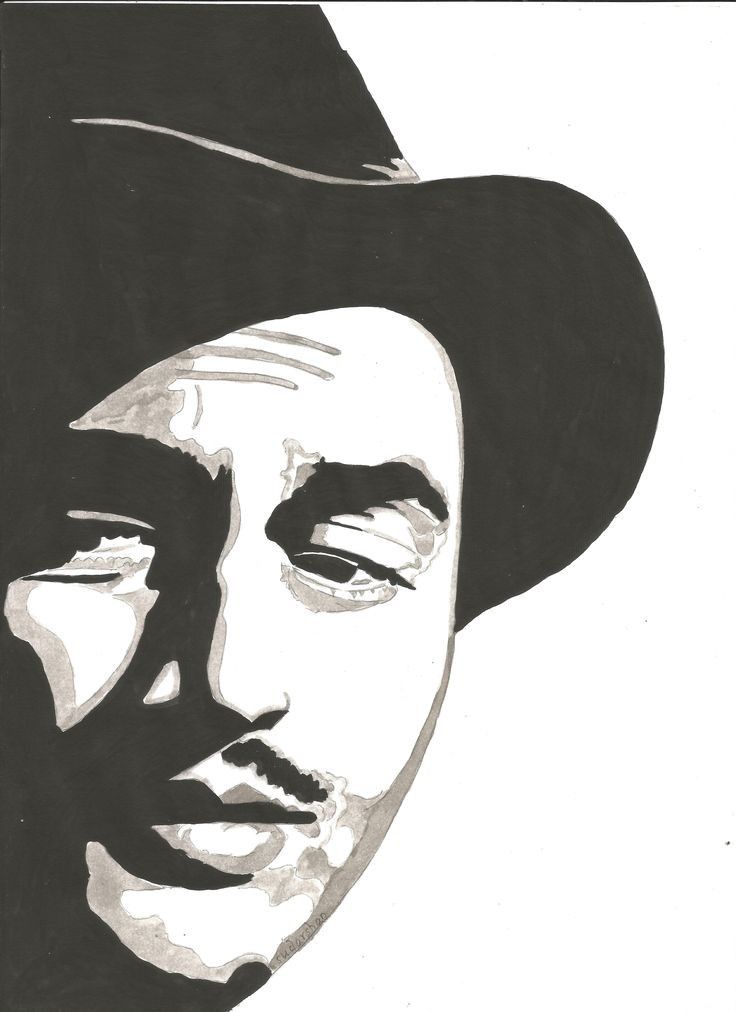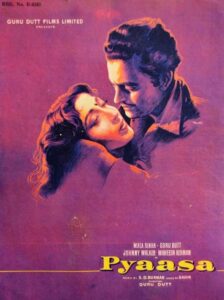Pragya Anji
Today marks the birth anniversary of one of Indian cinema’s most brilliant and soulful visionaries — Guru Dutt, born on July 9, 1925. As we remember the man whose cinematic artistry continues to inspire generations, it feels only fitting to revisit one of his most iconic works: Pyaasa.
In the vast landscape of Indian cinema, few films have left as lasting an impression as Pyaasa. For lovers of soulful storytelling, poetic anguish, and unforgettable music, it stands as a milestone — not just in Hindi film, but in world cinema.

Guru Dutt, often celebrated as the “Orson Welles of Indian cinema,” was a master of blending commercial elements with deeply introspective, often melancholic narratives. Pyaasa was my gateway into his genius — although, admittedly, my teenage distractions prevented a full appreciation on first viewing. And yet, several moments from that experience refused to fade: Vijay’s tearful confrontation with his mother’s death, his poignant visits to Gulabo’s brothel, and the elevator scene with Meena still haunted me.
Years later, I returned to Pyaasa, this time with the attention and reverence it deserves. What I found was not just a film, but a deeply moving, enduring reflection on society, art, and the search for meaning.
The Story of Pyaasa: A Poet’s Journey Through Rejection and Redemption
At the heart of Pyaasa lies Vijay, an Urdu poet navigating rejection, poverty, and emotional turmoil in the backstreets of Calcutta. Played by Guru Dutt himself, Vijay’s words are deemed worthless by publishers, and even his brothers view his poetry as garbage. His isolation leads him to walk away from his family.
Along this path, he meets Gulabo, a kind-hearted prostitute played by the luminous Waheeda Rehman, who sees the truth of Vijay’s soul and falls in love with him. Meanwhile, his former lover Meena (Mala Sinha) has married the wealthy publisher Mr. Ghosh for security, though she confesses she still loves Vijay.
In a tragic turn, a beggar is mistaken for Vijay and declared dead. Gulabo, unaware of the mix-up, gets his poems published through Ghosh. The work is received with critical and commercial acclaim — a cruel irony, as the poet himself lies imprisoned in a mental asylum, declared mad for asserting his identity.
With the help of his loyal friend Abdul Sattar (Johnny Walker), Vijay escapes and confronts a world that once rejected him but now celebrates him in death. In a climactic moment of spiritual clarity, Vijay renounces fame, family, and false love, choosing instead a quiet, anonymous life with Gulabo.
Performances That Breathe Life Into Poetry
Guru Dutt’s portrayal of Vijay is nothing short of haunting. His trademark melancholic intensity brings the struggling poet to life with raw authenticity.
Waheeda Rehman, in one of her earliest roles, is a revelation. Though Gulabo’s screen time is limited, Rehman’s eyes alone speak volumes — her quiet dignity and compassion linger long after the film ends.
Mala Sinha’s Meena is also finely crafted. She embodies the timeless dilemma of choosing between love and financial security. Sinha’s performance adds emotional complexity to a character that could have easily become a stereotype.
Special mention must go to Johnny Walker, whose presence as Abdul Sattar offers moments of levity without undercutting the film’s weight. The supporting cast is uniformly excellent, making every scene feel alive and significant.
A Masterclass in Direction and Cinematography
Pyaasa is a visual poem, thanks to Guru Dutt’s brilliant direction and the stunning cinematography by V.K. Murthy. Dutt’s command over close-up shots and deliberate camera blocking turns every frame into a carefully composed painting.
Each scene is soaked in symbolic lighting and shadow, amplifying the emotional and philosophical undertones of the narrative. It’s no exaggeration to say Pyaasa is one of the most visually accomplished films in Indian cinema history.
Words and Music That Echo Through Generations
The screenplay, written by Abrar Alvi and Guru Dutt, is said to be inspired in part by the lives of poet Sahir Ludhianvi and Amrita Pritam — though Dutt’s struggles inform the emotional gravity of the story.
And then there’s the music. Composed by the legendary S.D. Burman, with lyrics by Sahir Ludhianvi, the soundtrack of Pyaasa is soul-stirring. Songs like “Jaane Woh Kaise Log The Jinke…” (sung by Hemant Kumar) and “Yeh Duniya Agar Mil Bhi Jaaye To Kya Hai…” (sung by Mohammed Rafi) elevate the film into something transcendent. Each song doesn’t just complement the narrative — it deepens it.
Why Pyaasa Still Matters Today
Nearly seven decades after its release, Pyaasa remains stunningly relevant. Its exploration of materialism, artistic integrity, and the loneliness of the misunderstood creator speaks to anyone who has ever felt like an outsider.
In an age where content often chases virality, Pyaasa reminds us that true art takes time, pain, and vulnerability. The film’s ultimate message — that human connection and inner peace matter more than fame — continues to resonate, especially in today’s hyper-commercialized world.

Honoring Guru Dutt on His Birth Anniversary
On what would have been Guru Dutt’s 100th birth year, Pyaasa remains more than just a film — it’s a testament to his unique ability to portray beauty in despair and meaning in silence. His work continues to inspire not only filmmakers but also poets, dreamers, and anyone who has ever felt unseen.
Revisiting Pyaasa is like opening a well-worn book and discovering new meanings between the lines. It’s a film that grows with you — one that reveals new truths with every viewing.
Guru Dutt’s genius lies not just in his direction or acting, but in his courage to speak uncomfortable truths. Pyaasa is not just a story of a poet — it’s a mirror held up to society, asking us to see the invisible, hear the silenced, and value the brokenhearted.
So today, on Guru Dutt’s birthday, let us honor his legacy by returning to the stories he told with such aching beauty. Watch Pyaasa. Let it move you — again, or for the very first time.
How has Guru Dutt’s work touched your life? Share your thoughts below as we celebrate his enduring legacy.
